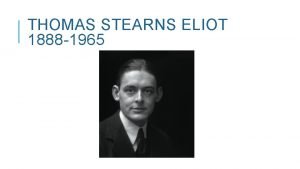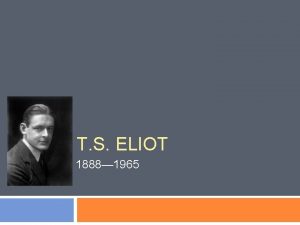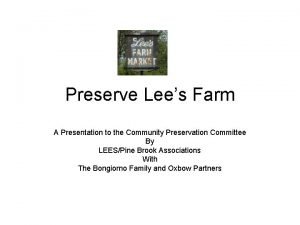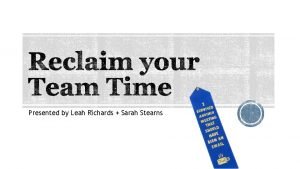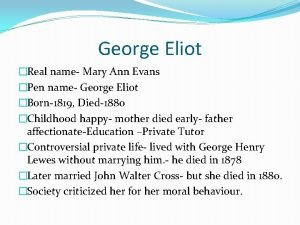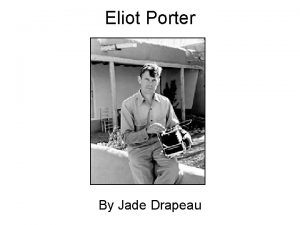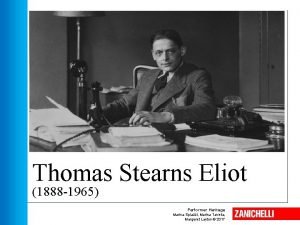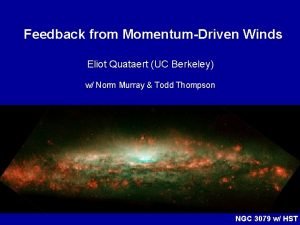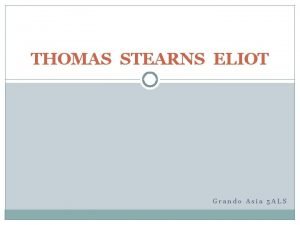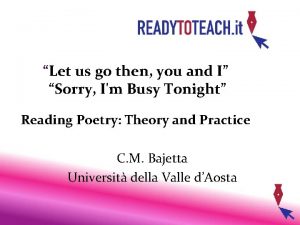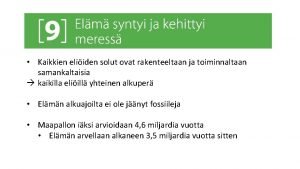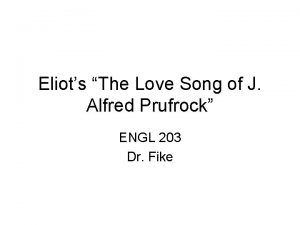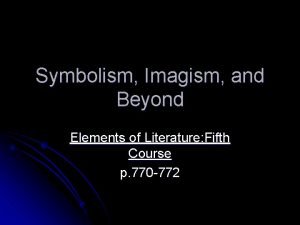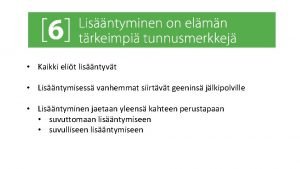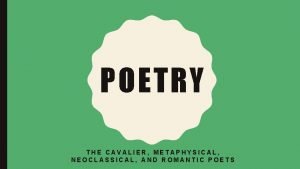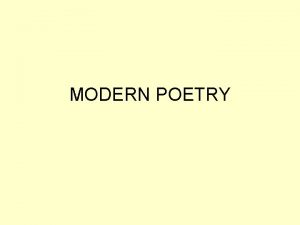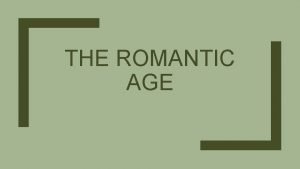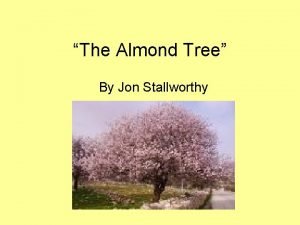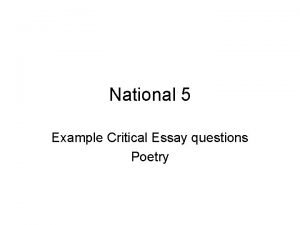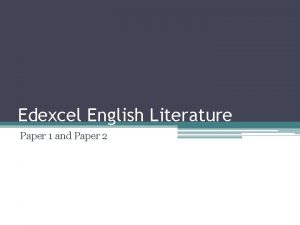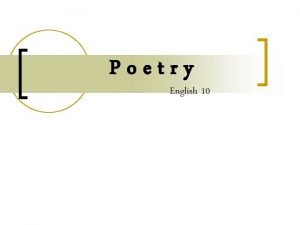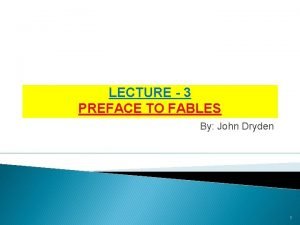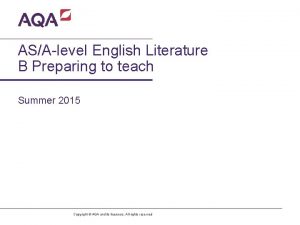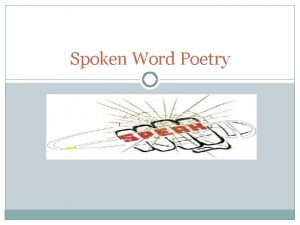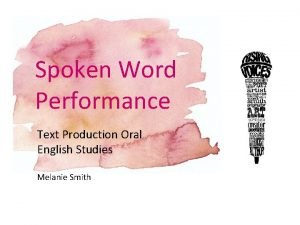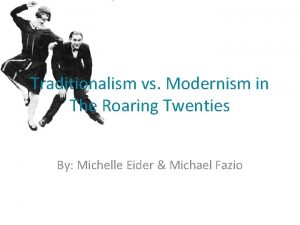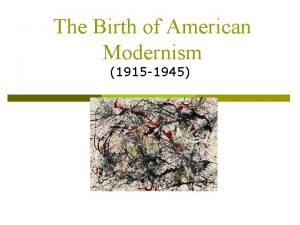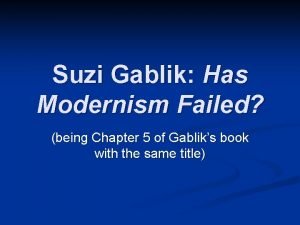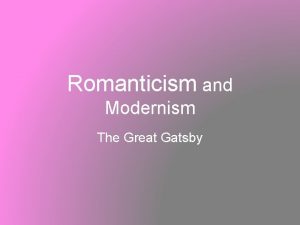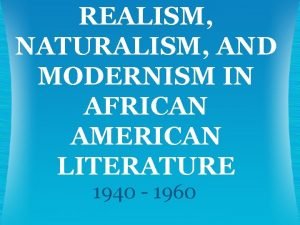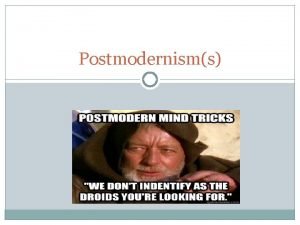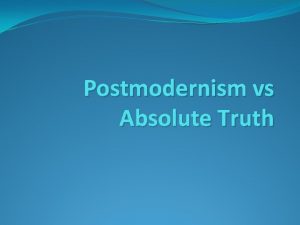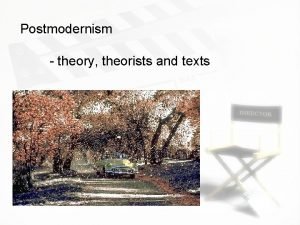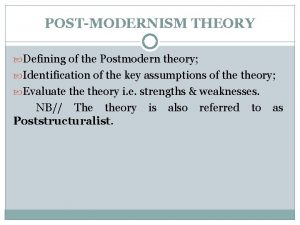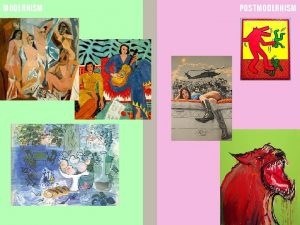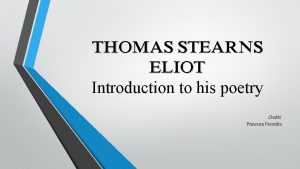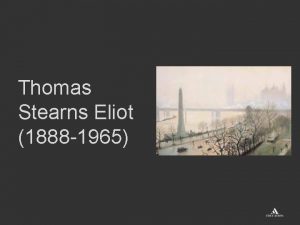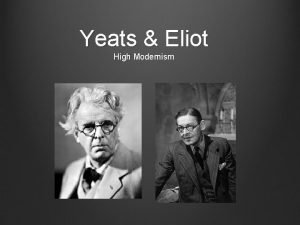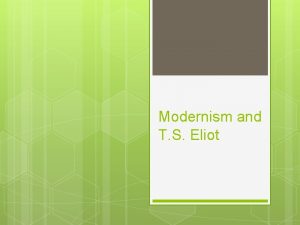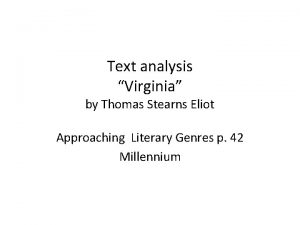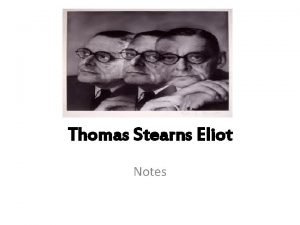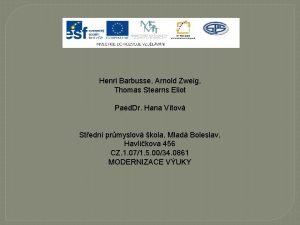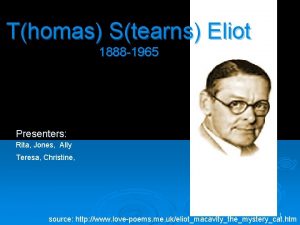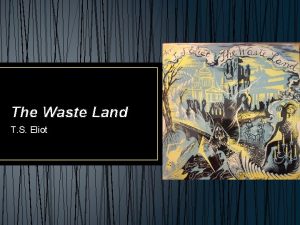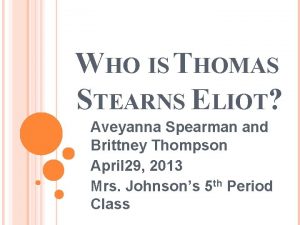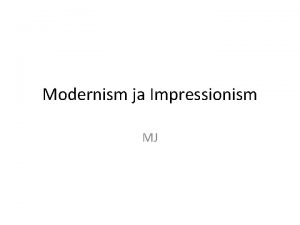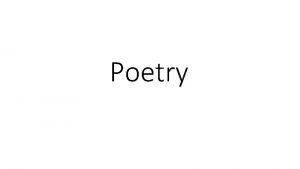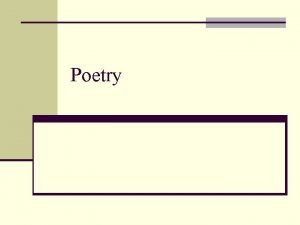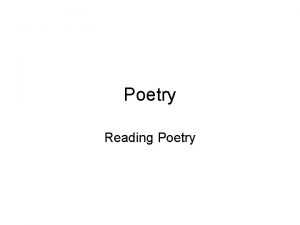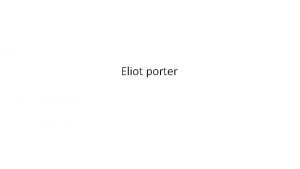English Poetry II Modernism Thomas Stearns TS Eliot
















































- Slides: 48

English Poetry II - Modernism

Thomas Stearns (TS) Eliot (September 26, 1888 – January 4, 1965) was born in Missouri, USA. His father was a wealthy industrialist but Eliot sometimes felt ashamed of his father’s business success.

In 1914, he attended Harvard University and visited The University of Oxford, UK as an exchange student. However, World War I started and prevented him receiving his degree. Eliot decided to stay in England pursue poetry writing.

In 1915, Eliot published his first famous poem “The Love Song of J. Alfred Prufrock. ” In 1915, Eliot also met the poet Ezra Pound who became his mentor/editor. This year Eliot also met and married Vivienne Haigh-Wood.

In 1922, Eliot published his most famous poem, The Waste Land. This poem addressed the alienation of modern culture, and created a new kind of poetry. Around this time, Eliot’s wife Vivienne became increasingly sick and mentally disturbed.

In 1925, he began working for the publisher Faber & Faber. He eventually became a director of this company. He also started to write famous literary criticisms, partly to explain his own poetry style and technique.

In 1927, Eliot became a British citizen and converted to Anglicanism, the English-form of Christianity. In 1932, he separated from his wife Vivienne and she was put into a mental hospital in 1938. In the 1930 s, he also started to write successful plays as well as poetry.

In 1945, Eliot published Four Quartets which was regarded as a masterpiece. In 1948, he was awarded the Nobel Prize for Literature. In 1957, Eliot married his secretary Esme Fletcher, who was 30 years old.

In his old age Eliot suffered badly from respiratory diseases such as bronchitis. In 1965, he died of emphysema. This is a disease of the lungs. But when he died he was a recognised as arguably the most important English-language poet of the 20 th century.

The Love Song of J. Alfred Prufrock is commonly referred to as just "Prufrock". The poem was completed in 1911 but not published until 1915. It is often called the “first Modernist poem. ” At the time, Prufrock was considered shocking and offensive, but is now seen as part of a cultural change from late 19 th century Romantic poetry to Modernist poetry.

The poem is about the feelings and thoughts of J. Alfred Prufrock as he walks to meet a woman for tea and considers a question he feels he should ask her (something like "Will you marry me? "). In fact, he never has tea with the woman and the poem is composed of Prufrock's neurotic and poetical ideas. The poem shows Prufrock’s emotional distance from the world as he believes he is inferior.

Epigraph: This epigraph is taken from Dante's Divine Comedy. The words are spoken by a lost soul damned to Hell for attempting to buy forgiveness in advance of committing a crime. This reflects Prufrock's desire to know the answer to the question he wants to ask (probably will you marry me? ) before asking the question itself. Epigraph is a short quotation at the beginning of a chapter or book which suggests theme.

Lines 1 -3: Prufrock invites an unspecified "you" to go with him to an unspecified place. But when they go he says the evening is spread out against the sky “like a patient etherised upon a table” (2). This means the sky is pressing down upon him so he feels like he has been spread out upon a table. The word "etherised" means sedated, so indicates a sense of helplessness and numbness. Therefore even something beautiful in nature is negative for Prufrock.

Lines 4 -7: He describes a route where he and "you" will walk. It is part of the city where there are cheap hotels along with lower-class restaurants. "Muttering retreats" suggests places where people go to speak in low voices so their conversations will not be heard. The language suggests ageing and decay. For example, the streets are “half-deserted”(4) and the restaurants are “sawdust” (7).

Lines 6 -7: The phrase "one-night" refers to hotels where lovers meet in secret and “restless” suggests some sexual activity. The reference to "oyster-shells" also has connotations of sexuality, as it is a food said to improve sexual stamina. However, these descriptions of sexual behaviour do not seem positive and appear sleazy.

Lines 8 -12: "Streets" are described by a simile (like a tedious argument) that suggests once you pass through them, the things you have seen continue to affect you afterwards - much like a boring argument. “Insidious” (9) means that something effects you in a subtle, but very harmful way. Specifically this could refer to people in romantic/sexual contact in the hotels and restaurants. Clearly, the idea of sex upsets and disgusts Prufrock.

Lines 8 -12: This idea affects Prufrock's thoughts about where he is going, causing him to think about an "overwhelming" question. Possibly something like “Will you marry me? ”. The use of the ellipsis ( …. ) indicates that the "you" with Prufrock maybe asked what that question would be. It is though there is a part of the conversation missing. But Prufrock does not answer, and continues with his visit.

Lines 13 -14: This situation presented in the preceding stanza causes Prufrock to imagine the room he is walking towards. In this room he imagines women preparing tea and talking about some intellectual or artistic subject (Michelangelo). This image seems quite random and out of sync with his most recent thoughts.

Lines 15 -22: But Prufrock's attention returns from this imagined room to his actual surroundings. Prufrock describes how it is a foggy evening and how the fog mixes with the chimney smoke. He likens the movement of the fog with the movements of a catlike creature around the structure of the city.

Lines 15 -22: For example, the yellow fog “rubs its back, ” (15) “rubs its muzzle” (16) “licked its tongue” and “curled once about the house” (22). There are many other examples of cat-like language in this part of the text. The dream-like state evoked by the fog reflects Prufrock's thoughts and state of mind. The “yellow” fog also suggests decay and ageing again.

Lines 23 -27: Prufrock's contemplation of the smoke/fog reminds him that imagined activity has no correlation to actions or events in real life. He decides that there is time for the fog and smoke (for the real life actions and events), and there is also time to get himself adjusted to what he is about to do. Therefore, he thinks he can adapt to the possibility of marriage and/or human relationships or “prepare a face for the faces that you meet” (27).

Lines 28: However, at the 4 th repetition of the phrase "There will be time" (28) he focuses on what he is about to do and is overwhelmed. Eliot exaggerates Prufrock's emotional state by comparing these actions and events to acts of murder and creation (28).

Lines 29 -34: The reference to "works and days" (29) is to an 8 th century B. C. poem by Hesiod about a Greek farmer who urges his brother to work as hard as he does. Thus Prufrock imagines that other hands work harder than him. However, he still maintains he has time for a hundred indecision and dream-visions (like the cat-like fog from the previous stanza) before he eats toast and tea.

Lines 29 -34: This part of the poem is also interesting because Prufrock is clearly talking about the domestic world of marriage and a conventional lifestyle. Prufrock references toast and tea (34) and mentions putting a question “on your plate”(30). This suggests he has some fear of married life and the possibility that it could be boring or tedious for him.

Lines 35 -6: The reference to having tea is followed by a repeat of the image of the women in the room talking about Michelangelo. Lines 37 -44: Here Prufrock's thought process becomes a little silly as he imagines himself losing his determination to participate in normal life. He describes how he turns and walks down some stairs before even knocking on the door to have toast and tea.

Lines 37 -44: Ironically, he sees how silly he is acting and he begins to imagine how other people might judge him. He includes a stream of his thoughts (bracketed in the poem) and critical comments he imagines others saying about him. For example, “(They will say: ‘How his hair is growing thin!)” (41) and (But how his arms and legs are thin!)” (44) suggest people gossiping about him and his appearance.

Lines 45 -48: Prufrock's third repetition of "Do I dare? " (45) is exaggerated to reflect the depth of his own terror and indecision. He repeats that while there is time for all these thoughts and actions, the situation is hopeless: the time it takes to make a decision is the same amount of time it takes to reverse that decision.


Lines 49 -54: Prufrock tries to explain why he is indecisive about his feelings toward the woman and life. Apparently it is because of the social life. He knows how people who live together act - or are supposed to act. He highlights the monotony of life by saying he has “known the evenings, mornings, afternoons” (50).

Lines 49 -54: He says “I have measured out my life with coffee spoons” suggesting that he has drunk so many cups of coffee in unbearable social situations that he could measure his life by them. “Voices dying" (52) refers to difficult and embarrassing social conversations that falter while those in the conversation pretend to be listening to music to cover their embarrassment.

Lines 49 -54: Finally Prufrock says “So how should I presume? ”. Prufrock is asking himself how can such a socially incompetent individual like him ever hope to be part of a normal human life and marriage with this woman? Prufrock believes he is an inferior and inadequate person to make this woman happy and to fit into a conventional lifestyle.

Lines 55 -58: Prufrock indicates that he is familiar with people who judge him according to a set of standards that do not reflect how he sees himself. The “eyes” (556) are the people in society who judge him. Eliot uses metaphor here to illustrate that such judgements make Prufrock feels like a bug stuck on a pin who is being collected and examined (57 -8). This makes him feel insignificant and helpless.

Lines 59 -61: He thinks that once these “eyes” have got him, he’ll have to talk about or rather "spit out" the story of his life ("days and ways") (60). But he says he’d be spitting out the "butt-ends" (60) of his life. “Butt-ends" are the useless ends of cigarettes which cannot be used. It seems like Prufrock is comparing his life to a used-up cigarette.

Lines 62 -69: Prufrock then recalls a thing he has "known" as a result of these social situations, which is symbolized by the image of female arms. These arms are “bare and braceleted” (63) suggesting a sensuality that is reminiscent of the previous images of the fog and the sexual associations of the hotels and restaurants.

Lines 62 -69: Prufrock wonders what has shifted his thoughts to this image and why he is digressing. He realises that it is the sight of a woman he walks with - her brown hair, the smell of perfume on her dress. At the end of the stanza, instead of "Should I presume? " he asks “Should I begin? ” implying his desire for the female touch is overriding his doubts.

Line 70 -72: Prufrock considers what he might tell the woman he is going to meet. Should he tell her about how he walked the streets at night, watched the smoke rising from the pipes of lonely men smoking out of windows. The image of "lonely men smoking pipes” (71 -2) clearly symbolizes Prufrock’s own loneliness.

Lines 73 -74: Prufrock acknowledges what he feels utterly hopeless in this situation. He says he should have been a pair of "ragged claws" in the "silent seas”. This image of a strange object that cannot speak suggests Prufrock's feeling that he is so inferior that he should be consigned to a world of silence.

Lines 75 -122: This part of the poem has been edited for the purposes of time and your attention. But basically Prufrock continues to discuss similar ideas in this part of the poem. Most critics say that by the end of this section of the poem, time has passed and now Prufrock is an older man.

Lines 122 -124: Prufrock’s questions here (Shall I part my hair behind? Shall I eat a peach? I shall I wear white flannel trousers? ) are satirical versions of the serious questions he tried to ask before. The use of the rhymed couplet here is particularly interesting because elsewhere the rhymed couplets had an ironic effect. Here the rhyme seems silly, as if to reflect the lack of thought Prufrock intends to put into the things he does as an old man.

Line 124: As he walks along the beach he mentions mermaids singing to him which also echoes the emotional frustration expressed by the earlier sea image of the "ragged claws. ”(73 -4) Line 125: Eliot uses this image of the Mermaids to show an experience of something wonderful and magical, but Prufrock refuses to believe that the Mermaid’s singing is for him.

Lines 126 -128: Prufrock repeats the image of the mermaids and says he has seen them playing in the sea. But he never joins them and continues to remain distant. This distance from the mermaids suggests he cannot have the emotionally fulfilling and exciting life he desires.

Lines 129 -131: The use of “We” might suggest reading the poem as a monologue of a divided self and split personality not that he is speaking to a woman. Prufrock suggests that at some point he has lingered around the image of these mermaids or “sea-girls” (130) and the positive things they represent for him.

Lines 129 -131: However, he always loses them because human voices awaken him and he must return to his reality in order to drown. To Prufrock, real life is a form of drowning since it is also a form of death to him. Sadly, Prufrock cannot reconcile with human life in the real world.

The poem is a dramatic interior monologue of an urban man, stricken with feelings of isolation. He is incapable of decisive action which epitomizes the frustration and impotence of the modern individual and represents thwarted desires and modern disillusionment.

Eliot narrates the experience of Prufrock using the stream of consciousness technique developed by Modernist writers. Stream of consciousness is a narrative device used in literature to depict the countless thoughts and feelings which pass through the mind. This is why the poem is confusing at times because some of the thoughts and questions seem a bit random.

The poem can be seen as the romantic stress of a young man about the woman he loves. However, the poem also uses this situation to explore the peculiarly Modernist alienation of the individual in society and shows how internal emotional alienation occurs. Therefore, it is an examination of the tormented mind of a middle-class, modern man - overeducated, well-spoken, neurotic and emotionally stilted.

Modernist literature was a movement started in late 19 th and early 20 th centuries, mainly in Europe and North America. Modernism was characterized by a break with traditional styles of poetry and verse. Modernists experimented with literary form and expression.

It was driven by a conscious desire to upset traditional modes of representation and express the new sensibilities of their time. The horrors of the First World War made people reassess the prevailing assumptions about society. Thinkers such as Sigmund Freud were influential in the literature because he questioned the rationality of mankind.
 Tom stearns eliot
Tom stearns eliot When was ts eliot born
When was ts eliot born Eugene stearns
Eugene stearns Stearns
Stearns Stearns farm stand
Stearns farm stand Sarah stearns psychologist
Sarah stearns psychologist Bill stearns
Bill stearns George eliot birth name
George eliot birth name Eliot porter biography
Eliot porter biography Count the day lost summary
Count the day lost summary Count that day lost by george eliot
Count that day lost by george eliot Eliot marina
Eliot marina Eliot quataert
Eliot quataert What is the message of the poem count that day lost
What is the message of the poem count that day lost Tom stern eliot
Tom stern eliot T. s. eliot tradition and the individual talent
T. s. eliot tradition and the individual talent Salon eliot serial
Salon eliot serial Let us go then you and i when the evening is spread
Let us go then you and i when the evening is spread Ensimmäiset monisoluiset eliöt
Ensimmäiset monisoluiset eliöt What is objective correlative
What is objective correlative Ts eliot and ezra pound
Ts eliot and ezra pound Suvuton ja suvullinen lisääntyminen
Suvuton ja suvullinen lisääntyminen Pathologist and anthropologist
Pathologist and anthropologist Cavalier poetry definition
Cavalier poetry definition Experimentation in modern poetry
Experimentation in modern poetry Lyric poetry tells a story
Lyric poetry tells a story Augustan and romantic literature
Augustan and romantic literature Jon stallworthy the almond tree
Jon stallworthy the almond tree National 5 english critical essay questions poetry
National 5 english critical essay questions poetry Medieval poetry notes
Medieval poetry notes Flowers poetry in english
Flowers poetry in english Edexcel literature paper 1
Edexcel literature paper 1 Allama iqbal philosophy of education
Allama iqbal philosophy of education Example of symbol
Example of symbol John dryden as a critic slideshare
John dryden as a critic slideshare Characteristics of british romanticism
Characteristics of british romanticism Aqa english literature b nea examples
Aqa english literature b nea examples Feelings and opinions are the “stuff” poetry is made of
Feelings and opinions are the “stuff” poetry is made of Oral english text
Oral english text Eduqas poetry anthology resources
Eduqas poetry anthology resources Modernist vs traditionalist
Modernist vs traditionalist American modernist novels
American modernist novels Suzi gablik
Suzi gablik The great gatsby romanticism
The great gatsby romanticism Naturalism vs modernism
Naturalism vs modernism Modernism vs postmodernism literature
Modernism vs postmodernism literature Premodernism modernism and postmodernism
Premodernism modernism and postmodernism Postmodern theory
Postmodern theory Post modernism sociology
Post modernism sociology
